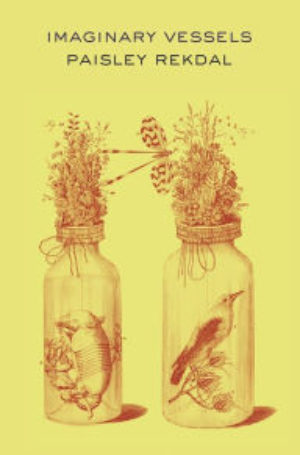In Their Own Words
Paisley Rekdal on “When It Is Over it Will Be Over”

When It Is Over it Will Be Over
Pen and ink painting by Troy Passey of a line by
Edna St. Vincent Millay
Hurricane of what must be
only feeling, this painting's
sentence circling to black
on blank, ever-
tightening spiral
of words collapsing
to their true gesture: meaning
what we read
when not reading,
as the canvas buckles
in the damp: freckled
like the someone
I once left sleeping
in a hotel room to swim
the coast's cold shoals, fine veils
of sand kicked up by waves where
I found myself enclosed
in light: sudden: bright
tunnel of minnows
like scatterings of
diamond, seed pearl whorled
in the same
thoughtless thought
around me: one column of scale
turning at a moment's decision,
a gesture I
was inside or out
of, not touching but
moving in
accord with them: they
would not wait for me, thickening
then breaking apart as I slid
inside, reading me
for threat or flight by the lift
of my arm, as all
they needed to know
of me was in the movement:
as all this sentence
breaks down to Os and Is,
the remnants of someone's
desires or mine so that
no matter if I return
to that cold coast, they will
never be there: the minnows
in their bright spiraling
first through sight, then
through memory,
the barest
shudderings of sense:
O and I
parting the mouth with a cry
that contains—
but doesn't need—
any meaning.
From Imaginary Vessels (Copper Canyon Press, 2016). All rights reserved. Reprinted with the permission of the author.
On "When It Is Over it Will Be Over"
My poem "When it is Over, it Will be Over" takes its title from a pen-and-ink drawing by the artist Troy Passey of a line from Edna St. Vincent Millay's poem "Endings." I came across Passey's drawing five years ago while in Boise, where the Boise Art Museum had a show up of Passey's art. I was immediately struck by Passey's stark, gestural paintings. "When it is Over" is a window-sized, ever-tightening spiral of words, Millay's phrase worked into what looks, from a distance, like a hurricane of slapdash hatches in white and black. Passey is an artist whose work focuses primarily on words, usually snippets of poems and novels that most of us have had (whether accidentally or deliberately) drilled into us over our education. One recent series, "library," includes black and white paintings of phrases like "wine dark sea" and "nothing gold can stay": the irony being that the pieces call up colors that the viewers are forced to imagine, thus we "overwrite" Passey's otherwise spare phrases with our own emotional and imaginative palettes. Passey's art works on me in much the same way that books do, allowing me to create vibrant worlds out of plain black and white. That day in the museum before his "When it is Over," I was of course thinking of Millay, and thinking too of Passey's spiral of black word-hatches, but I could not help but be drawn by association also into my own memories of a dwindling romance, of spoken and unspoken words, of a spiral of minnows I once found myself caught inside while swimming. In my ekphrastic response to Passey's painting, I wanted my poem to be one long, paratactic, and hallucinatory sentence that destabilized the reader's own senses and memories while also heightening them. Hopefully, I achieved something a little like this.



